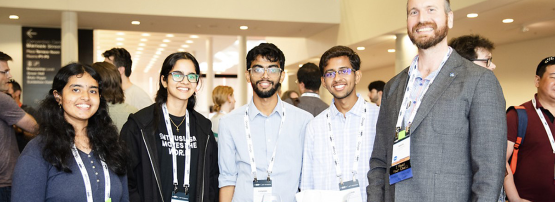
In this episode of PING, Vanessa Fernandez and Kavya Bhat, two National Institute of Technology Karnataka (NITK) students, discuss the student-led, multi-year project to deploy IPv6 at their campus. Kavya and Vanessa have just graduated, and are moving into their next stages of work and study in computer science and network engineering.
In 2023 and 2024, they attended IETF 118 and IETF 119 and presented their project and its experiences to the IPv6 working groups and off-working group meetings, in part funded by ISIF Asia via the APNIC Foundation.
This multi-year project is supervised by the NITK Centre for Open-source Software and Hardware (COSH) and has an outside review from Dhruv Dhody and Nalini Elkins. Former students have also acted as alumni and remain involved in the project as it progresses.
We often focus on large-scale IPv6 deployments in the telecommunications sector or small-scale lab implementations, but there’s another side to the IPv6 story — deploying it in large campus networks. These networks are comparable in scale to significant factory or government department installations, but in this case, the work was carried out by volunteer staff with little or no prior networking experience. In this episode, Vanessa and Kavya share their experiences on the project and discuss what they presented at the IETF.
Read more information on the NITK and their IPv6 deployment project on the APNIC Blog, the IETF website and the APNIC Foundation pages:
- Migrating the NITK Surathkal Campus Network to IPv6 (APNIC Foundation)
- How Deploying IPv6 at NITK Led me to IETF (Vanessa Fernandez, APNIC Blog)
- A newcomer’s experience at IETF (Kavya Bhat, APNIC Blog)
- IPv6 Deployment at NITK (IETF 118 Presentation)
Subscribe and share your story
You can stream and subscribe to PING via the following channels:
If you’re interested in sharing your insights or research, please get in touch — we’re always looking for great stories from the community. Please let us know what you think of the podcast and the APNIC Blog so we can keep improving.
The views expressed by the authors of this blog are their own and do not necessarily reflect the views of APNIC. Please note a Code of Conduct applies to this blog.

I want to learn online corces